Opinions & Interviews
Indian Ambassador on life in Belarus and areas of mutual interest in cooperation
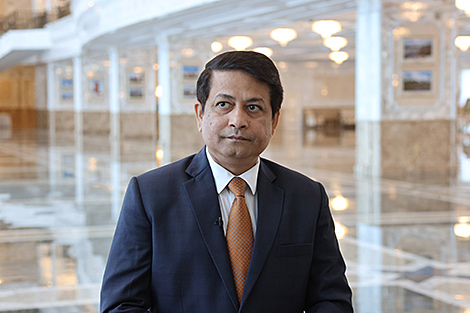
An archive photo
Despite many global challenges, Belarus and India continue to strengthen bilateral cooperation, Ambassador Extraordinary and Plenipotentiary of the Republic of India to the Republic of Belarus Alok Ranjan Jha said in an interview with BelTA as the country celebrated the National Day on 26 January. The diplomat spoke about the country’s path towards independence and its youthfulness as 65% of India's population are people under the age of 35. He called important the mutual support of the two countries in international organizations, economic contacts, including the pilot project by Belorusneft to increase the level of production at six fields in India. Ambassador Alok Ranjan Jha also thanked Belarus for taking in Indian students who had previously studied in Ukrainian universities.
Your Excellency, what does the Republic Day of India symbolize and with what achievements the country approaches this year celebrations?
The Constitution of India, the basic governing document of the country, was adopted by India’s Constituent Assembly on 26 November 1949 and came into effect on 26 January 1950. Hence, 26 January is commemorated as the Republic Day of India. This date, 26 January, was chosen as it was on that day in 1930 that the Declaration of Indian Independence was proclaimed by the Indian National Congress.
India, under the strong and dynamic leadership of Prime Minister Narendra Modi, continues on its journey of inclusive development at a brisk pace despite several global challenges. In the past year India became the 5th largest economy of the world surpassing the United Kingdom. At the growth rate of 8.7% (in 2021), India is currently the fastest growing large economy in the world.
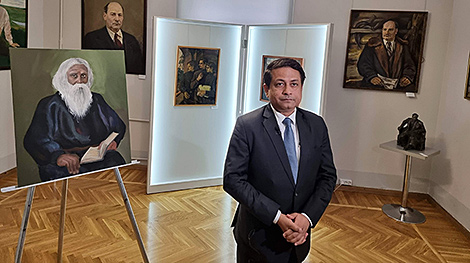
We are going to become the most populous country in the world this year. However, India, with more than 65% of its population below the age of 35, remains a largely young nation when other leading economies are aging. Apart from being young, the Indian human resource also possesses high scientific and technological calibre which augurs well for a future demographic dividend.
How has India dealt with the COVID-19 pandemic and what is the current situation in the country? Were the COVID restrictions for the Indian nationals and foreign guests softened, and to what extent?
COVID-19 pandemic continues to present significant set of challenges to the entire world including India. However, despite the scale and uniqueness of her challenges, India offered a firm response to the unprecedented situation caused by the COVID-19 pandemic. It was a whole-of-society-approach whereby both government and non-governmental support worked tirelessly towards providing preventive and therapeutic healthcare facilities, diagnostic and research facilities as well as tracking services in order to minimize fatalities. The strategy adopted by the Government of India had the following elements: COVID appropriate behavior, test, track, treat and vaccinate.
On 16 January 2021, India rolled out the world's largest COVID-19 vaccination drive across more than 3000 vaccine centers covering the length and breadth of our large country. As on 22 January 2023, 2.2 billion doses of COVID vaccines have been administered and nearly 70% of the large Indian population is fully vaccinated.
The vaccination policy has been a dynamic one with adequate flexibility to address the ever-changing COVID scenario. Amongst other highlights, the use of digital technology for facilitating vaccination and monitoring vaccination coverage has been truly remarkable.
The COVID restrictions on Indian nationals as well as travellers to India have considerably softened from what they were about 12-18 months back. However, as with any other country, these policies need to remain vibrant and responsive to various emerging scenarios. Hence, there have been times in the last few months when some of the restrictions, in varying degrees, have been re-imposed with regard to travellers from certain parts of the world.
Your Excellency, how would you describe the Belarusian-Indian relations against the backdrop of the difficult situation in the world?
The robust state of India-Belarus ties is reflected by the fact that despite myriad global challenges our two countries have continued to enhance bilateral cooperation. Year 2022 witnessed holding of 7th Round of India-Belarus Foreign Office Consultations after a gap of nearly four years as well as the 11th Meeting of the Inter-Governmental Commission on Economy, Trade, Industry, Science, Technology and Culture. Our Foreign Ministers met multiple times both bilaterally and at multilateral forums. Our trade continues despite logistical and payment related challenges. Our Defence Minsters met on the sidelines of the Shanghai Cooperation Organization meet in 2022.
2022 also marked the 30th anniversary of India-Belarus diplomatic relations. A year-long celebrations were launched with a gala concern in April 2022. Several other cultural events were organized to mark the momentous occasion. A commemorative stamp was launched jointly by the two countries.
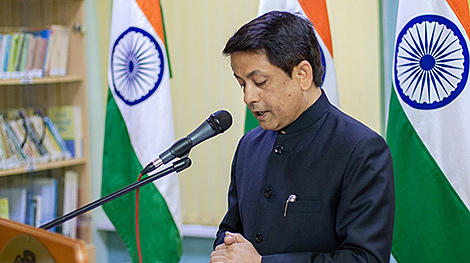
In 2022, several Belarusian nationals benefited from short-term training programmes under Indian Technical and Economic Cooperation (ITEC) and a Belarusian diplomat attended Professional Course for Foreign Diplomats organized by the Indian Ministry of Foreign Affairs.
India and Belarus have also continued their cooperation in international organizations and stood by each other on several issues of mutual concern. India extended strong support to Belarus during 2021-22 in its capacity as a Non-Permanent member of the United Nations Security Council (UNSC).
How is trade, economic, scientific and technical interaction between our countries developing?
While bilateral trade is improving, it still remains below potential. Payment and logistics issues related to trade, especially export of potash from Belarus, have had an adverse impact on bilateral trade in the immediate past. Therefore, it is time to branch out beyond the conventional strengths and explore new products and areas of cooperation. The major lacuna has been the lack of information on both sides about the opportunities present in the other country. We are working on resolving this by sharing a list of products that are of interest in bilateral trade, as well as participating in exhibitions.
An example of this would be the participation of Belneftekhim in the India Chem 2022 exhibition in New Delhi. Both countries are exporters of petrochemical products, and in this regard, we positively note this move. Similarly, Belorusneft completed the pilot project of chemical enhanced recovery at six onshore fields of India (of Oil and Natural Gas Corporation of India) during 2020-2021.
We are also building contacts between institutions like the National Center for Marketing and Price Study from Belarus, with counterpart institutions in India, as well as between the Chambers of Commerce in Industry on both sides.
On the science and technology front, the 9th meeting of the Joint Commission for Cooperation in Science and Technology was held in August 2020. We look forward to holding the 10th meeting during 2023-24. The National Academy of Sciences of Belarus is collaborating with the Indian Council of Scientific and Industrial Research and are working out the details of an agreement to formalize and further this cooperation.
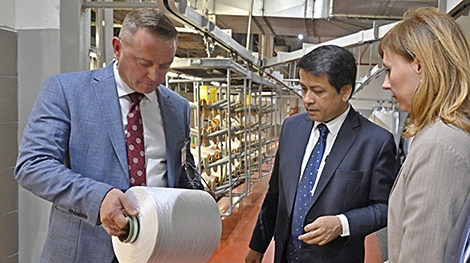
What are the main areas of bilateral contacts in education and culture?
Educational contacts between India and Belarus go back to the Soviet days. Today, nearly a thousand Indian students are studying in Belarus, most of them at the Belarusian high-quality medical universities. I would like to take this opportunity to thank the concerned Belarusian authorities for facilitating admission of Indian students who were displaced from Ukraine.
We invite Belarusian higher education institutions to collaborate in joint projects and research with their Indian counterparts such as IITs, NITs and other central institutions.
Interest in each other's culture, especially cinema, music, food and yoga go back several decades. 2021-2022 witnessed a busy cultural calender with musical concerts, festival of Indian films in all the major cities of Belarus, a textile exhibition at the National Library in Minsk, several public occasions showcasing Indian cuisine and celebration of International Day of Yoga in June 2022 were some of the highlights in this regard.
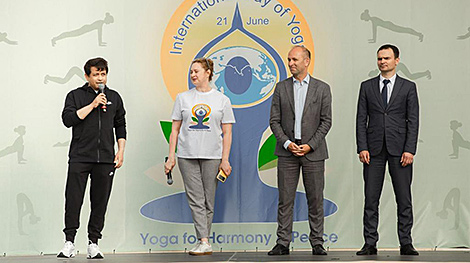
A dance troupe from the Indian state of Maharashtra performed at the prestigious Slavianski Bazaar in 2022. We also utilized this occasion to showcase Indian tea and mangoes. We look forward to hosting more cultural delegations from India in Belarus and vice versa in the coming days.
The Program of Cooperation in Culture is ready for adoption and we expect it to be signed soon for the period 2023-2025. This will help establish and further contacts through exchange of cultural delegations, exhibitions, and mutual participation in film festivals among other activities.
What are the foreseeable future prospects for Belarusian-Indian cooperation, in your opinion?
Cooperation in the foreseeable future will be a combination of reinforcing the traditional strengths of our bilateral relations and exploring new areas. India has been importing BelAZ dumptrucks for its coal mining operations. We are also keen on agricultural machinery such as tractors produced by MTZ. Considering the size of the Indian market, as well as India's pivotal position connecting West, South and South East Asia, we welcome Belarusian companies to invest in manufacturing as part of our Make In India initiative, and benefit from the Production Linked Incentive and other similar schemes of the government. India could become the regional manufacturing, export and service hub for Belarusian machinery.
Both of our countries have a strong IT-ITeS industry base. We could work together in developing Human Resources, capacity building, and projects driven towards e-Governance. As India becomes a global FinTech hub, Indian IT and ICT (Information and Communications Technology) companies can support Belarus in building a robust digital infrastructure for the financial sector of Belarus.
India is also interested in building on the traditional people-to-people relations from the days of the Soviet Union. Our country provides ample opportunities for winter tourism from Belarus. Thanks to its rapid growth, India is also becoming an important center for MICE (Meetings, Incentives, Conferences and Exhibitions) Tourism. These are some of the areas in which we are keen on future cooperation with Belarus.
How long have you been working in Belarus, what places in Belarus have you already managed to visit and what do you like in our country?
I have been in Belarus for about a year and a half. I arrived in July 2021 and since then have extensively traveled all over the country. I have been to all the six regions (and major cities) of Belarus. To some regions/cities I have undertaken two or even three visits. I have also had the opportunity to visit some of the smaller towns of Belarus.
As far as your question about liking is concerned, my short answer is: everything. There is nothing in Belarus which I dislike! However, if I were to be more specific, I absolutely adore the natural beauty of this country-the lakes, rivers and vast green expanse of the country are a balm for both one's eyes as well as the soul.
Belarusian people are kind, generous and highly curious about Indian culture, economy, policy, etc. The amount of goodwill towards India that I have witnessed in people here has touched me deeply.


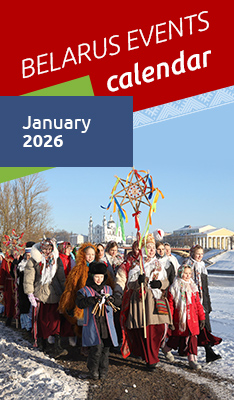




 print version
print version make home page
make home page add to bookmarks
add to bookmarks

